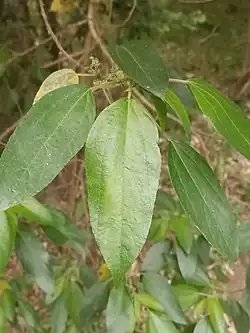Pipturus argenteus
| Pipturus argenteus | |
|---|---|

| |
| Scientific classification | |
| Kingdom: | Plantae |
| Clade: | Tracheophytes |
| Clade: | Angiosperms |
| Clade: | Eudicots |
| Clade: | Rosids |
| Order: | Rosales |
| Family: | Urticaceae |
| Genus: | Pipturus |
| Species: | P. argenteus
|
| Binomial name | |
| Pipturus argenteus | |
Pipturus argenteus, known as false stinger, native mulberry, white mulberry, white nettle, amahatyan (Chamorro), and ghasooso (Carolinian), is a small tree native to tropical Asia, northern and eastern Australia and the Pacific.[1][2][3]
Unlike many members of its family, this species does not sting.[4] It has been used traditionally for medicine and for making rope.[2][5]
References
- ^ a b IUCN SSC Global Tree Specialist Group & Botanic Gardens Conservation International (BGCI) (2021). "Pipturus argenteus". IUCN Red List of Threatened Species. 2021: e.T63087A192375389. Retrieved 4 March 2023.
- ^ a b F.A.Zich; B.P.M.Hyland; T.Whiffen; R.A.Kerrigan (2020). "Pipturus argenteus". Australian Tropical Rainforest Plants Edition 8 (RFK8). Centre for Australian National Biodiversity Research (CANBR), Australian Government. Retrieved 6 June 2021.
- ^ "Pipturus argenteus". Plants of the World Online. Royal Botanic Gardens, Kew. Retrieved 28 June 2021.
- ^ Harden, G. "PlantNET - FloraOnline". PlantNET (The NSW Plant Information Network System). Royal Botanic Gardens and Domain Trust, Sydney. Retrieved 12 September 2024.
- ^ Kodela, P.G.; Chew, W.-L. (2022). Kodela, P.G. (ed.). "Pipturus argenteus". Flora of Australia. Australian Biological Resources Study, Department of Climate Change, Energy, the Environment and Water: Canberra. Retrieved 12 September 2024.
External links
 Media related to Pipturus argenteus at Wikimedia Commons
Media related to Pipturus argenteus at Wikimedia Commons Data related to Pipturus argenteus at Wikispecies
Data related to Pipturus argenteus at Wikispecies- Map of recorded sitings of Pipturus argenteus at the Australasian Virtual Herbarium
